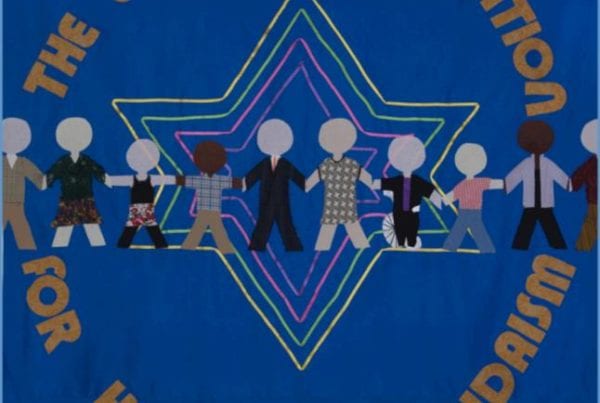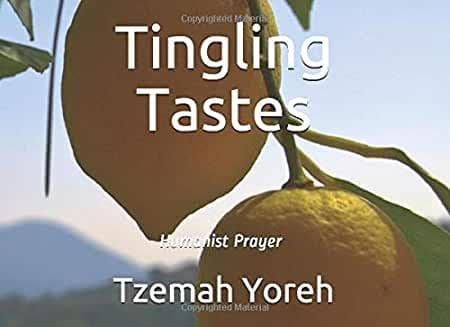On Transition
Sandy Farber
Rosh Hashana 2018
L’shanah tovah. My name is Sandy Farber, and I’m a long-time member of the congregation, having joined in the 1990s. One of the reasons I always love this time, the turning of the year, is because of the opportunity it offers us to consider the mysteries of transition and change: looking back, looking forward, considering our present moment. Change is never NOT happening, even when we might experience stability, tranquility, or peacefulness – it is happening right now, to all of us, as we sit here. We are growing, growing up, living, ageing – regardless of all of what we may feel about it. We might celebrate it, dread it, try to ignore it. We might experience it more acutely, become more aware of it, when there is an event that marks it – for example, the appointment of a new rabbi, and the retirement of a long-tenured, familiar rabbi.
My most recent personal transition involves a decision I made in my fifties to enter a new professional field – not my first change of fields, by the way. Career transition is hard, but, for me, it is thinkable. I have moved from being an activist for progressive social change in the crazy East Village of the late 1970s and 80s, to being lawyer for low-income people, primarily in housing-related issues, with The Legal Aid Society, to teaching in a law school, to becoming involved in a family business, where my primary task is to manage an elongated generational transition with the founder, in his 90s, struggling to accept the inevitability of transition. In the past few years, wanting to get back to work that speaks more directly to my heart, I have been training as a psychoanalyst. Not your parents’ classical psychoanalysis, but a newer way of working and theorizing that has been developing over the past thirty-some years, informed by developments in social theory, feminist theory and gender studies, and queer theory. A leading theorist and practitioner of this movement, which is called ‘relational psychoanalysis’, was the brilliant psychoanalyst Stephen Mitchell, who died, unexpectedly, of a heart attack in his early 50s. Among the works of this prolific writer is a book called Hope and Dread in Psychoanalysis. That title, the words ‘hope’ and ‘dread’, captures best what I would like to say about the experience of transition.
Some change, like a planned retirement, is expected, giving us perhaps the illusion that it is controllable, though the experience may very well still be unsettling. This is perhaps a different experience than change that is abrupt, unexpected, shocking. Sometimes unexpected change can be welcome; for example, as I sit in the summer writing this, it’s very hot and sunny outside – no rain in the forecast. Suddenly: a thunderstorm. The garden is happy. This is unexpected, and welcome; it brings hope. In contrast, an event like the sudden death of a leader in a field (I think of Stephen Mitchell but also of Rabbi Sherwin Wine, for example): unexpected, shocking, tragic. Or the election of Donald Trump: for many of us that was also shocking, unexpected, tragic, and brought a kind of existential dread, especially for those, like our 24-year-old son Ben, who grew up in the Obama years.
And speaking of our children, seeing them grow, in our families or here in the congregation, presents us with perhaps one of the deepest opportunities for the indescribable mix of feelings that comprise wonder: hope for them, dread of what could harm them. So it is also, I think, with organizations. As a long-ago President and co – President of the congregation, I was actively involved in our effort to have our first rabbi, Rabbi Peter, officially hired (and paid!) with a grant from a far-sighted benefactor connected with our movement. That process, as I remember it, was fraught – the congregation had grown and was quite successful as an all-volunteer effort; how would having a paid rabbi change things? Hope, and dread. And now, as we transition to the leadership of our new rabbi, Rabbi Tzemah – again, how will it change us? Certainly it will change us – can we stay the same while changing? Change while staying the same? Will change be good? What will be the aspects that are harder? We look forward with that mixture of feelings, hope and trepidation, and hope again. As a congregation we have the courage to have confidence in the future, because the alternative is to wish the impossible – to stop change.
Hope and dread – when I was a young activist, decades ago, I would not have been able to foresee that I would be able to marry my partner Cynthia, let alone at a festive wedding surrounded by family and friends. Change can happen in a way that illuminates. Or it can happen in a way that appears to extinguish the light: today we face governmental policies and laws that seek to institutionalize bigotry, intolerance, xenophobia and hatred. Yet despite the dread, we must also find hope. My father, with his parents and sister, escaped tyranny and near certain execution in post WWII Romania. I was the first child in my family born in the US: embodying hope, certainly, but also carrying transgenerationally the dread that my elders lived with but could not speak. Now we see a repetition of that terror, the turning away, the othering, the keeping people captive in camps, the taking away of the children. It may remind us of the past, but we are compelled to recognize the horror in the present. And, as we stand for justice and compassion, we must hold onto our hope.
I would like to share with you a poem that I think captures the paradoxes
that I am trying to describe. It is by the Palestinian-American poet Naomi Shihab
Nye, and called Trying To Name What Doesn’t Change.
Trying To Name What Doesn’t Change
Roselva says the only thing that doesn’t change
Is train tracks. She’s sure of it.
The train changes, or the weeds that grow up spidery
By the side, but not the tracks.
I’ve watched one for three years, she says,
And it doesn’t curve, doesn’t break, doesn’t grow.
Peter isn’t sure. He saw an abandoned track
Near Sabinas, Mexico, and says a track without a train
Is a changed track. The metal wasn’t shiny anymore.
The wood was split and some of the ties were gone.
Every Tuesday on Morales Street
Butchers crack the necks of a hundred hens.
The widow in the tilted house
Spices her soup with cinnamon.
Ask her what doesn’t change.
Stars explode.
The rose curls up as if there is fire in the petals.
The cat who knew me is buried under the bush.
The train whistle still wails its ancient sound
But when it goes away, shrinking back
From the walls of the brain,
It takes something different with it every time.
Happy new year.



